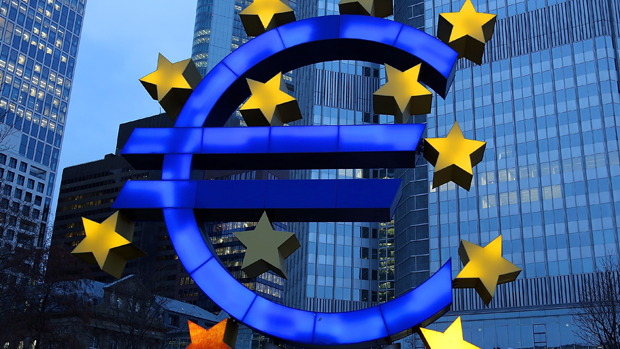Quantitative easing in the eurozone - how does it work?
The ECB is has announced a huge programme of money-creation - but what does that actually mean?

A free daily email with the biggest news stories of the day – and the best features from TheWeek.com
You are now subscribed
Your newsletter sign-up was successful
The European Central Bank (ECB) has announced a massive programme of quantitative easing (QE) for the eurozone today. The idea is to fight low inflation - and stave off the spectre of deflation.
Expectations were so high that there were warnings of "serious disappointment in financial markets" if a programme was not announced, says the BBC's Andrew Walker. In the end those fears were ungrounded as the ECB announced it would purchase €60bn of bonds per month until the end of September 2016 at least - "far more than previously expected", according to the BBC.
There have been warnings that deflation - both a symptom and a cause of economic decline - could reignite the eurozone's debt crisis, says Walker. And ECB president Mario Draghi is worried that cheaper oil could lead to what he calls the "second round effects" of deflation.
The Week
Escape your echo chamber. Get the facts behind the news, plus analysis from multiple perspectives.

Sign up for The Week's Free Newsletters
From our morning news briefing to a weekly Good News Newsletter, get the best of The Week delivered directly to your inbox.
From our morning news briefing to a weekly Good News Newsletter, get the best of The Week delivered directly to your inbox.
These include consumers holding-off from purchases because they expect prices to keep getting lower, and companies firing staff to cut costs and dropping prices further still in their efforts to encourage people to spend.
QE offers a solution: by buying government debts using specially-created money, the ECB can perhaps get the eurozone economies moving again. It works because buying large quantities of bonds can raise their price, which then lowers the return investors make on them.
The investors are mostly financial institutions. Lower returns should lead to them reducing interest rates, which in turn should encourage businesses to invest more and consumers to spend more.
The ECB has tried QE before - as have the UK and US in recent years - but this time it is likely to be on a bigger scale than we have seen before, says Walker.
A free daily email with the biggest news stories of the day – and the best features from TheWeek.com
UBS chairman Axel Weber yesterday said he expected the ECB to announce a "sizeable programme" of QE but warned it was "only part of the fix", says the Financial Times.
Weber said the danger was that the more the ECB does to help, the less pressure governments will feel to act. He insisted that governments "need to deliver policy reforms" - in other words, cut spending and implement austerity programmes.
-
 Why is the Trump administration talking about ‘Western civilization’?
Why is the Trump administration talking about ‘Western civilization’?Talking Points Rubio says Europe, US bonded by religion and ancestry
-
 Quentin Deranque: a student’s death energizes the French far right
Quentin Deranque: a student’s death energizes the French far rightIN THE SPOTLIGHT Reactions to the violent killing of an ultraconservative activist offer a glimpse at the culture wars roiling France ahead of next year’s elections
-
 Secured vs. unsecured loans: how do they differ and which is better?
Secured vs. unsecured loans: how do they differ and which is better?the explainer They are distinguished by the level of risk and the inclusion of collateral
-
 Epstein files topple law CEO, roil UK government
Epstein files topple law CEO, roil UK governmentSpeed Read Peter Mandelson, Britain’s former ambassador to the US, is caught up in the scandal
-
 Iran and US prepare to meet after skirmishes
Iran and US prepare to meet after skirmishesSpeed Read The incident comes amid heightened tensions in the Middle East
-
 Israel retrieves final hostage’s body from Gaza
Israel retrieves final hostage’s body from GazaSpeed Read The 24-year-old police officer was killed during the initial Hamas attack
-
 China’s Xi targets top general in growing purge
China’s Xi targets top general in growing purgeSpeed Read Zhang Youxia is being investigated over ‘grave violations’ of the law
-
 Panama and Canada are negotiating over a crucial copper mine
Panama and Canada are negotiating over a crucial copper mineIn the Spotlight Panama is set to make a final decision on the mine this summer
-
 Why Greenland’s natural resources are nearly impossible to mine
Why Greenland’s natural resources are nearly impossible to mineThe Explainer The country’s natural landscape makes the task extremely difficult
-
 Iran cuts internet as protests escalate
Iran cuts internet as protests escalateSpeed Reada Government buildings across the country have been set on fire
-
 US nabs ‘shadow’ tanker claimed by Russia
US nabs ‘shadow’ tanker claimed by RussiaSpeed Read The ship was one of two vessels seized by the US military